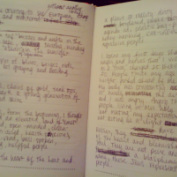| "Those who can't do teach." Have you heard that line, too? I loath that joke. Are you kidding me?! Listen to my typical weekday: I wake up at 5:30 AM; I park at school by 7 AM for a day of planning, grading, teaching, counseling, coaching; I return home between 6:30 and 7:00 PM for a couple hours of planning and grading; and I find about 20 minutes to read in bed before I fall asleep. I DO quite a lot, and I work hard at it, too. |
Granted, many professions have their "humorous" stereotypes: lawyers are evil, accountants and librarians are boring, businesspeople are greedy, and so on. But why is the joke about teachers beyond a personality trait and instead that they can't do?
Among my favorite teacher empowerment pieces is one by Taylor Mali, "What Teachers Make," where he recounts his answer to "What do you make?" describing all that he creates, and essentially all that he does. It is almost the antidote to the age-old teacher jibe. His slam poetry makes me feel empowered and proud and inspired to be a teacher.
But the question still lingers, "Is it true? Can I not DO what I teach?"
This year, I've entered a personal experiment, partially sparked by Penny Kittle's philosophy to try alongside students, partially sparked by that nagging joke about teachers. My experiment is to put myself out there, to DO what I teach. I ask my students to write and publish and be okay with failure, so must I. And it's not easy. Failure is not fun, but I guess that's part of the experience.
I'm writing articles for a website. I keep a (somewhat) daily journal. I signed up for a personal essay writing and publishing course (WritingPad). I'm challenging myself to keep up a (meaningful) blog. I've presented poetry and a personal essay to my peers. And an important part of this experience is being okay with the possibility of failure (Diana Laufenberg: How to learn? From mistakes). It is not important whether I become rich and famous from my pursuits. The important thing is that I'm willing to try and willing to fail, and I'm DOING what I teach.
I never want to hear someone question whether I actually do what I teach, so I am taking action. Teaching is a profession unto itself, and I am already DOING a whole lot, but I also see that educators can enhance their knowledge bases by doing what they ask their students to do and by grounding their teaching in experience.
Further questions to ponder:
What are ways you can apply your subject specialties to experiences outside of the classroom?
How can this apply to primary grades?
Among my favorite teacher empowerment pieces is one by Taylor Mali, "What Teachers Make," where he recounts his answer to "What do you make?" describing all that he creates, and essentially all that he does. It is almost the antidote to the age-old teacher jibe. His slam poetry makes me feel empowered and proud and inspired to be a teacher.
But the question still lingers, "Is it true? Can I not DO what I teach?"
This year, I've entered a personal experiment, partially sparked by Penny Kittle's philosophy to try alongside students, partially sparked by that nagging joke about teachers. My experiment is to put myself out there, to DO what I teach. I ask my students to write and publish and be okay with failure, so must I. And it's not easy. Failure is not fun, but I guess that's part of the experience.
I'm writing articles for a website. I keep a (somewhat) daily journal. I signed up for a personal essay writing and publishing course (WritingPad). I'm challenging myself to keep up a (meaningful) blog. I've presented poetry and a personal essay to my peers. And an important part of this experience is being okay with the possibility of failure (Diana Laufenberg: How to learn? From mistakes). It is not important whether I become rich and famous from my pursuits. The important thing is that I'm willing to try and willing to fail, and I'm DOING what I teach.
I never want to hear someone question whether I actually do what I teach, so I am taking action. Teaching is a profession unto itself, and I am already DOING a whole lot, but I also see that educators can enhance their knowledge bases by doing what they ask their students to do and by grounding their teaching in experience.
Further questions to ponder:
What are ways you can apply your subject specialties to experiences outside of the classroom?
How can this apply to primary grades?

 RSS Feed
RSS Feed